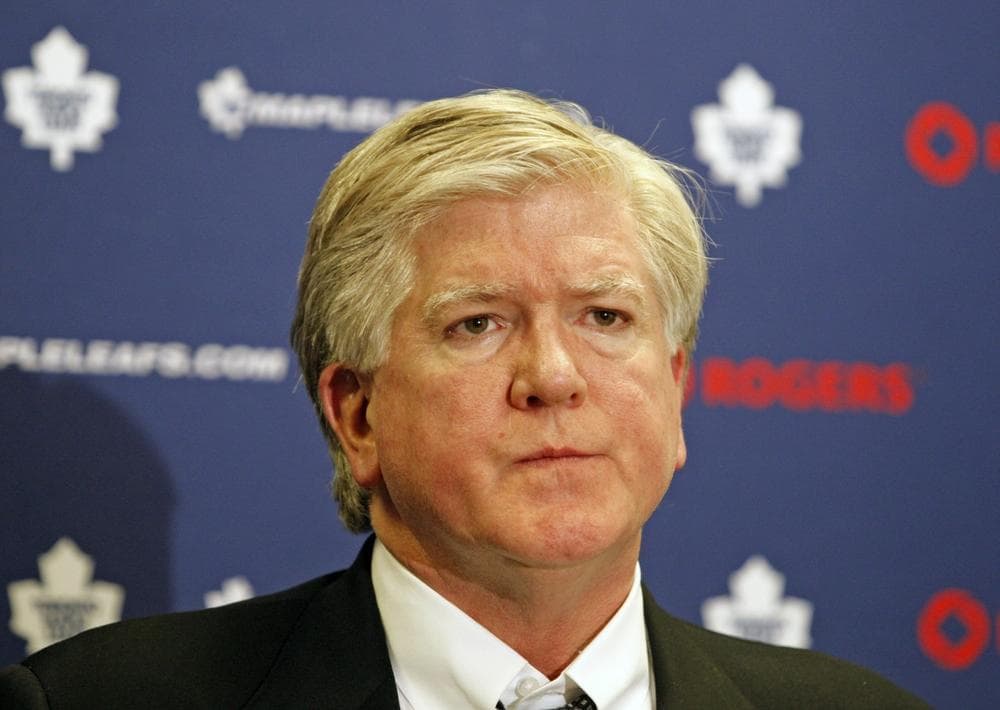Advertisement
Feature
'You Can Play' Promotes Acceptance In Pro Sports

Though the first active openly gay player in a major league came out in the NBA, there have been efforts to foster environments of inclusion and acceptance in all sports. Chief among them has been the You Can Play Project, which was founded in 2012 after a car crash claimed the life of openly gay former hockey player Brendan Burke. You Can Play, which the NHL partnered with in April, was founded by Brendan’s father, then-Toronto Maple Leafs General Manager Brian Burke and by his son Patrick, a scout for the Philadelphia Flyers. Patrick Burke joined Bill Littlefield to discuss the project.
BL: Tell me a little bit about You Can Play and its mission.
[sidebar title="The Jason Collins Story" align="right"] Find out the story behind the story of Jason Collins's historic announcement.[/sidebar]PB: Well, our idea is that sports is supposed to be for everybody. When you step on the ice, when you step on the court, when you step on the field, whatever it might be, that you should only be judged by what you bring to the team. If you’re a contributing player, if you work hard, if you’re talented, if you’re good enough to help a team win, then you’re on that team, so if you can play, you can play.
Gay athletes don’t get a fair shot to play because they have to deal with harassment and intimidation and stigmas and the type of anti-gay language that gets thrown around the locker room. So our mission is to eliminate that type of language, make an inclusive locker room, and let’s make sports better for everybody.
BL: What have you already accomplished as a result of the newly forged partnership with the NHL?
PB: I think the partnership in of itself is an accomplishment. I mean you’re talking about the first time that any major professional sports league in North America has done an official partnership with an LGBT rights group to this extent, providing us with official access to players, providing players with confidential access to us. Six months ago the NHL and the NHLPA were in a heated lockout and couldn’t agree on anything, and now they’ve both agreed that You Can Play is worthy of being an official partner, that LBGT rights are something the hockey community wants to fight for and that we’re all in this together.
BL: Your late brother Brendan came out a year before he passed away. Tell me a little bit about his struggles as a gay athlete and how they inspired you and your father to do something about homophobia in sports.
PB: Well one of things that Brendan talked about a lot was that it was hard to sit in a locker room and hear those words, that no matter who you are, when you’re struggling with your own sexual orientation, when you’re struggling to discover who you are as a person, it takes a toll on you. Brendan’s senior year of high school he ended up leaving the hockey team in part because of this and in part because he was worried his teammates would find out he was gay. You’re talking about the son of a National Hockey League General Manager who didn’t feel entirely comfortable in a hockey locker room. That kind of made me realize there’s a lot of work left to be done, a lot of change that needs to be made to the culture of sports and I felt we were in a position to do just that.
BL: Martina Navratilova said this week that Jason Collins’ decision to come out will undoubtedly save lives. Do you agree?
PB: Yeah I do. For young athletes who have the game taken away from them because of any reason, but especially sexual orientation, we do lose kids because of this, because they don’t feel at home on their hockey team, on their soccer team, whatever it might be. And without sports they lose direction, they lose purpose, they lose something that they care so much about. That we do know that there are kids out there who because of losing a sport end up losing much, much more than that. So I agree entirely. I think what Jason’s doing is absolutely going to save lives, and also improve lives, just make kids feel a little bit safer, a little bit better about themselves. I think that’s important.
BL: I understand that when You Can Play began, you envisioned a time when the organization would no longer be necessary. What was your original estimate regarding the end of You Can Play, and did that estimate change soon after Jason Collins made his announcement?
PB: We signed on for an eight-year commitment. With everything that’s happened since we launched with the official partnership with the work we’re doing with other leagues and with Jason Collins, I’m not sure it’s going to take eight years. I think it might be something where in five years we can go and disband or whether it’s hand it down to the next generation of sports activists or whatever it might be. Now it’s kind of like we’re almost done already.
This segment aired on May 4, 2013.